- Home
- Stephanie Laurens
The Capture of the Earl of Glencrae Page 2
The Capture of the Earl of Glencrae Read online
Page 2
Leaving Angelica standing between Debenham and Theo, and facing Giles Ribbenthorpe. Theo met her eyes, smiled and saluted her, nodded to Debenham and Ribbenthorpe, and moved away into the crowd.
Ribbenthorpe, who could read the signs as well as any other man, nevertheless arched a brow at her and, lips curving, inquired, “Will you dance, Miss Cynster?”
“Thank you for the invitation, Ribbenthorpe, but I believe I’ll stand out from this set. However, Lady Cavendish will be thrilled to see you on her floor, and Jennifer Selkirk”—she tipped her head toward a young brunette standing alongside her dragon of a mother—“could do with rescuing. I suggest you play St. George.”
Ribbenthorpe turned to survey the Selkirks, then laughed, bowed, and, still smiling, walked off. Angelica was pleased that he acted on her suggestion and drew Jennifer onto the floor.
Finally alone with Debenham, she dropped all pretence of acceptable social distance and pointedly directed her gaze at his cane.
He hesitated, but then obliged. “An old injury from before I first came to town. I can walk, but can’t risk dancing—my knee might well collapse under me.”
Raising her head, she studied his face. “So you’ve never waltzed?” She loved to waltz, but if he was her hero . . .
“Not never. I was old enough to have learned and indulged at country balls prior to the accident, but I haven’t waltzed since.”
“I see.” Leaving that disappointment aside, she turned to more immediate concerns. “So if you haven’t been circling the floors at Almack’s or anywhere else, what avenues have you been pursuing in your quest to find your bride? You’re not easy to overlook—given that I, and Millicent and company, too, were unaware of your existence until this evening, I would own myself surprised if you’d attended any of the major events this past week.”
His eyes again held hers, as if gauging what would be acceptable to tell her.
She tipped up her chin. “Don’t tell me—you’ve been haunting some gaming hell, or carousing with friends.”
His lips curved in wry amusement. “Sadly, no. If you must know, I spent several days organizing to have some rooms in my London house refurbished, after which my first social forays were, unsurprisingly, into the clubs. Given I’ve been absent from town for so long, it was . . . unexpected, but gratifying to find so many still remember me.” He paused, then added, “Then Lady Cavendish’s invitation arrived, and I thought it time to test the waters.”
“So I’ve caught you at your first ton event.”
“Indeed.” He heard her satisfaction. His eyes searched her face. “Why are you preening?”
“Because, in ton parlance, that means I’ve stolen a march on all the other young, and not-so-young, ladies.”
He looked down at her as if inwardly shaking his head. “As much as I find your candor refreshing, are you always this forthright?”
“Generally, yes. Creating unnecessary complications through overnice adherence to the social strictures has always struck me as a waste of time.”
“Is that so? Then perhaps you’ll tell me—in all candor and without any overnice adherence to the social strictures—why you inveigled Curtis to introduce us.”
She opened her eyes wide. “You were hunting me.”
He held her gaze. “So?”
She’d expected him to deny it; the look in his eyes, an expression she associated with an intent and focused predator, made her breath tangle in her throat, but she evenly replied, “So now I’m hunting you.”
“Ah. I see. That must be some new twist in the customary matchmaking dance.” He glanced briefly around, then returned his gaze to her face. “Although I confess I haven’t noticed any other young ladies being quite so bold.”
She arched her brows. “They’re not me.”
“Clearly.” He looked into her eyes for a moment more, then said, “So tell me about Angelica Cynster.”
His voice had lowered; along with his changeable, mesmerizing eyes, it lured her on, as if reeling her in. She decided it wouldn’t hurt to let him think he was succeeding. “Anyone who knows me will tell you that I’m twenty-one going on twenty-five, and am commonly held to be the most confident, stubborn, and willful of all the Cynster girls, and none of us could be described as wilting flowers.”
“You sound like a handful.”
She arched a challenging brow at him and didn’t deny it.
The musicians launched into a second waltz. He hesitated, then said, “If you would like to dance, please don’t feel obliged—”
“I don’t want to dance.” She glanced around. The attention of all those not waltzing was focused on the dance floor, on the couples now whirling. “Actually . . .” She looked up and caught his gaze. “I’m finding it rather warm in here. Perhaps we might stroll on the terrace and get some air.”
He hesitated; again she got the impression that he was inwardly shaking his head at her, and not in an approving way. However . . . “If that’s what you wish, by all means.” Gracefully, he offered her his arm.
She put her hand on his sleeve, felt steel beneath the fabric, and smiled delightedly, as much at herself as at him. Her pursuit of her hero was underway.
His cane in his other hand, he very correctly escorted her to the open French doors that gave access to the terrace and the gardens beyond. Stepping over the threshold onto the terrace flags, she breathed in, savoring the near-balmy night. A wafting breeze caressed her nape, her throat.
The Cavendish House gardens were old, the trees large and mature, their thick canopies shading the steps at either end of the long terrace and deepening the general darkness of the night. She looked around, noted several other couples strolling in the faint light of the quarter moon, and steered Debenham in the opposite direction.
He noticed; although he obliged, when she glanced up, into his eyes, despite the shadows she sensed his disapproval, underscored by the set of his chiseled lips.
She widened her eyes. “What?”
“Are you always this . . . for want of a better term, forward?”
She tried to look offended, but her lips wouldn’t oblige. Regardless of any disapproval, he’d fallen in with her suggestion; they were slowly strolling further down the terrace that ran the full length of the salon. “I realize that gentlemen like to lead, but I’m impatient by nature, and also direct. I want to get to know you better, and you want to get to know me, and that requires being able to converse in private, so”—she waved at the expanse of deserted terrace before them—“here we are.”
“We’ve only just been introduced, and you’ve engineered a private interlude.” His tone held more resignation than complaint.
“I see no point in wasting time, and”—she glanced pointedly at the salon’s wide windows—“trust me, there’s nothing the least illicit about this. We’re in plain sight of the entire room.”
“All the occupants of which are facing the dance floor.” He shook his head. “You’re as bold as brass.” His gaze rose to her hair. “Just like your curls. Your brothers have my sympathies. You have two of them, I believe.”
“Indeed. Rupert and Alasdair—or Gabriel and Lucifer, depending on whether you’re within hearing of our mother or aunts.”
“I’m surprised neither of them is here, lurking in the shadows, ready to step in and ride rein on you.”
“I grant you they would try were they here, however, happily, these days they have better things to do—wives to attend, children to dote over.”
“Nevertheless, you strike me as the sort of mettlesome female who requires a permanent keeper.”
“Strange though you may think it, not many would agree with you. I’m generally held to be remarkably sane and thoroughly practical—not the sort of female any perspicacious gentleman would attempt to take advantage of.”
“Ah—so that’s why no one seems to be ke
eping any close eye on you.”
“Indeed. It’s an outcome of being viewed as twenty-five, rather than twenty-one.”
He glanced back along the terrace; she did, too, noting the two other couples still strolling near the door.
When she looked back at him, he said, “You said you wanted to talk. About what?”
She studied his face, taking in the telltale features, the clean, strong lines that unequivocally placed him in her social class. “I’m puzzled that I can’t place you, that I can’t recall ever having seen you. When were you last in London? Theo thought it was four years ago.”
“It was five. I first came to town in ’20, and the last time I graced London’s ballrooms was in June of ’24. I’ve visited the city on business over the intervening years, but had no time for socializing.”
“Well, that explains it—I wasn’t presented until ’25. But perhaps you remember my sisters?”
He nodded. “Yes, I remember them, but in those days I wasn’t interested in young ladies. I spent more time avoiding them than chatting with them, and I don’t believe I ever spoke with your sisters. We were never introduced.”
“Hmm . . . so your return to the ballrooms in search of young ladies is something of a novel endeavor for you.”
“You might say that. But tell me, what of you?”
They’d reached the end of the terrace; halting at the top of the steps leading down to a gravel path, she glanced out into the gloom of the garden. The light thrown by the salon’s windows ended several yards back; the spot where they now stood was enveloped in dense shadows cast by nearby trees.
Drawing her hand from his sleeve and turning to face him, putting her back to the garden, she met his gaze and arched a brow. “What do you want to know?”
“You’re clearly very much at home in this sphere. Do you spend all your time in London?”
Looking into his shadowed face, she smiled. “As a Cynster, I’ve been a part of the ton for all my life, so it’s hardly surprising that I’m at home within its circles. That said, I spend only the months of the Season in town, and perhaps a month during the Little Season. For the rest of the year I’m in the country, either in Somerset, where I was born, or visiting family and friends.”
“Do you prefer the country, or town?”
She paused to think.
He glanced back along the terrace.
Idly following his gaze, she saw the last of the other strolling couples returning inside.
Then he looked at her again, and she refocused on his eyes. “Whether I prefer town or country is not easy to answer. I enjoy being in town with all the associated amusements and entertainments, but if, in the country, I had other things to occupy my time, my energies—other challenges to satisfy me—then I suspect I could be entirely content remaining far from London.”
He looked into her eyes for a long moment, then glanced down and propped his cane against the balustrade. “I have to admit”—straightening, he met her gaze—“that that’s something of a relief.”
“A relief?” She wanted to know, so she asked. “Why?”
He looked into her eyes, and she looked into his. Time seemed, oddly, unexpectedly, to suspend, to thin and stretch. Slowly, gradually, puzzlement rose and grew; she let it show in her eyes.
“My apologies.” The words fell from his lips, soft and low, so deep they were almost a caress.
She frowned. “What for?”
“This.”
Clapping one hand over her lips, wrapping his other arm around her, he picked her up. Holding her against him, he went swiftly down the steps and into the garden.
Shock, complete and absolute, held her frozen as he carried her into the deep shadows under the trees.
Then she erupted.
Behind his hand, she screamed, then wriggled and fought against his hold, but his body was as hard as rock, and the arm locking her against him might as well have been iron for all the give in it. Realizing the futility, she abruptly went boneless, slumping in his hold.
He halted in a small clearing along the path, screened from the house by thick shrubs, and eased her down until her feet touched the gravel; she held to her pretend-faint, waiting for her moment.
He released her suddenly, whipping his hand from her face, but at the same time spinning her around so that she teetered, tottered. Eyes wide, she flung out her arms, wildly tipping as she fought for balance. Raking the darkness—where had he gone?—she steadied, straightened, and sucked in breath to scream—
A silk handkerchief whipped over her head, across her lips and cinched tight; her scream was reduced to a muted shriek. She felt him knot the material at the back of her head. Jerking away, she whirled to face him, simultaneously reaching up to drag the gag away.
He’d moved with her; from behind, he caught both her hands, one in each of his, and drew them out, around, back and down. Ruthlessly locking her wrists in one hand, he held them low, her arms pulled straight, and stepped close behind her; she was about to drop to the ground when his other hand closed about her upper arm. “Don’t fall—you’ll wrench your arms if you do.”
She tensed to struggle again.
“Calm down. Despite all appearances, I’m not going to harm you.”
She responded with a tirade, smothered by the gag; furious, she squirmed, tugged, tried to break free, but that was hopeless. She tried to kick him, but he was too close, and all she was wearing was ballroom slippers. She couldn’t even hit him in the face with the back of her head because he was so tall.
Throughout her efforts, he stood like a rock, his grip on her hands unbreakable.
Her breath coming in pants, the muscles in her arms starting to ache, her hair tumbling around her face and neck, she quieted.
He bent his head, his voice falling through the darkness from above and a little to the side. “I repeat—I’m not going to harm you. I will explain this, but not here, not now. Rest assured I need you hale, whole, and healthy—I’m the last person who would hurt you, or allow anyone else to, either.”
He was supposed to be her hero! She hauled in a huge breath, felt her breasts rise dramatically. While one part of her, the furious, betrayed, ready-to-do-murder-or-at-least-scratch-his-eyes-out part, wasn’t prepared to believe a word he said, the more pragmatic and practical side of her listened to his tone, rather than his words, and suggested that she at least hear him out.
He believed what he was saying.
When she stood and waited, he went on in the same definite and faintly dictatorial tone, “I need to speak with you at far greater length. I’m going to carry you out of this garden and put you in my carriage. No, I’m not going to release you then—I’ll have you driven to my house. We can talk there.”
“Vul-oo-ntt-mm-gum-afa-da?”
Silence, then, “Will I let you go after that?”
She nodded.
He hesitated, then said, “Actually, that depends on you.”
She tried to look back and up at his face. Frowned direfully in that direction. “Wa-sis-sis?”
“You’ll learn all soon enough.” He leaned back, then she felt her shawl being untangled from about her elbows. It slid away.
The next instant, she felt the soft material being looped about her wrists. The fiend was tying her hands with her own shawl! There was nothing she could do to prevent him tugging the binding tight.
Before she could even tense to break free and race back to the house, he bent and swept her off her feet and up into his arms.
She cut off her squeal, squirmed, then realized that his hold, the fingers of one hand perilously close to the side of her breast, the fingers of the other burning her thigh through the silk of her skirts, was best left as it was. She subsided in smoldering silence. And tried to gather her wits enough to think.
The path cut through a small open area; in the fain
t light, she saw him glance at her face.
She narrowed her eyes, hoped he could feel the fulminating glare she bent on him.
If he did, he gave no sign. “My carriage is in the alley.” Looking ahead, he ducked under a low branch. For all the difficulty he had in carrying her, she might as well have been a small child. “And just so we understand each other, I had no intention of kidnapping you tonight—the soiree was supposed to be purely reconnaissance.” He glanced down at her again. “But you set the stage so perfectly, what was I supposed to do? Not take advantage, let you go, and pray that fate granted me another chance, at some other time?”
So it was her fault he’d kidnapped her?
He stepped out from under the trees, and the faint moonlight touched his face.
Eyes narrowed to shards, from behind the gag she gritted out, “Ou. Ill. Ay. Pfh-is.”
He’d glanced down at her. He studied her face for a moment, then arched his brows and looked ahead. “Indeed. I suspect I will.”
The path ended at a wooden gate set in the garden’s high stone wall. Debenham juggled her, unbolted the gate, swung it open, and carried her through, into the alley that ran beside the house.
A carriage was waiting in the darkness. She glimpsed a coachman on the box and a groom jumping down. The latter hurried to open the nearer door.
Trussed and gagged, and in the presence of three large men, she didn’t bother struggling or trying to resist as Debenham, the fiend, lifted her into the coach; he set her on her feet, spoke briefly to his groom, then climbed in after her—which left very little space for her to do anything at all.
One huge hand on her shoulder eased her down until she sat on the leather bench seat. She sniffed. The carriage smelled musty. Was it hired? She glanced at Debenham as he sat across from her; his legs were so long that his knees flanked hers.
Then he bent, captured her feet between his hands, and raised them, tipping her back against the seat. Ignoring her outraged shriek, he swiftly bound her ankles with . . . his groom’s kerchief?

 Lady Osbaldestone’s Plum Puddings: Lady Osbaldestone’s Christmas Chronicles Volume 3
Lady Osbaldestone’s Plum Puddings: Lady Osbaldestone’s Christmas Chronicles Volume 3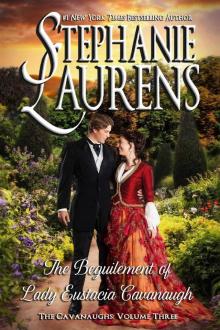 The Beguilement of Lady Eustacia Cavanagh: The Cavanaughs Volume 3
The Beguilement of Lady Eustacia Cavanagh: The Cavanaughs Volume 3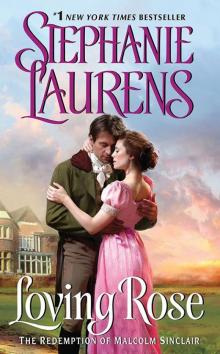 Loving Rose: The Redemption of Malcolm Sinclair (Casebook of Barnaby Adair)
Loving Rose: The Redemption of Malcolm Sinclair (Casebook of Barnaby Adair)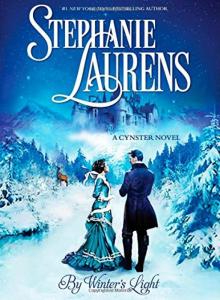 By Winter's Light
By Winter's Light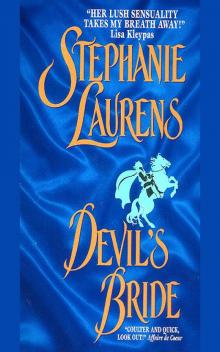 Devil's Bride
Devil's Bride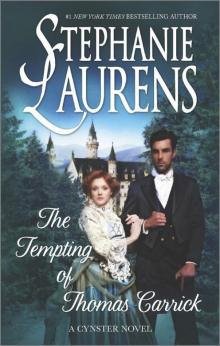 The Tempting of Thomas Carrick
The Tempting of Thomas Carrick![Cynster [22.00] A Match for Marcus Cynster Read online](http://i1.bookreadfree.com/i/03/16/cynster_[22_00]_a_match_for_marcus_cynster_preview.jpg) Cynster [22.00] A Match for Marcus Cynster
Cynster [22.00] A Match for Marcus Cynster All About Love c-6
All About Love c-6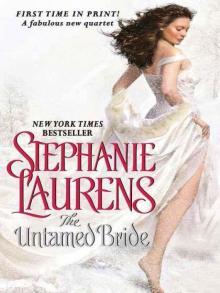 Cobra 01 The Untamed Bride
Cobra 01 The Untamed Bride A Lady of Expectations and Other Stories
A Lady of Expectations and Other Stories By Winter's Light_A Cynster Novel
By Winter's Light_A Cynster Novel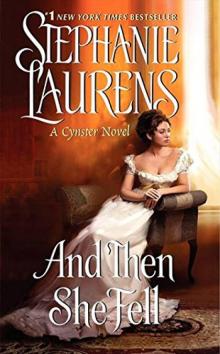 And Then She Fell
And Then She Fell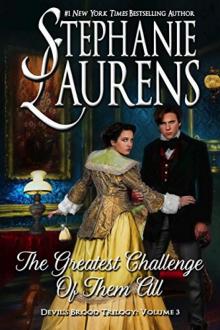 The Greatest Challenge of Them All
The Greatest Challenge of Them All The Edge of Desire
The Edge of Desire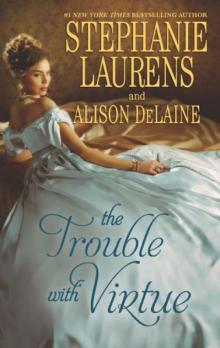 The Trouble With Virtue: A Comfortable WifeA Lady by Day
The Trouble With Virtue: A Comfortable WifeA Lady by Day Fair Juno
Fair Juno THE LEGEND OF NIMWAY HALL: 1750 - JACQUELINE
THE LEGEND OF NIMWAY HALL: 1750 - JACQUELINE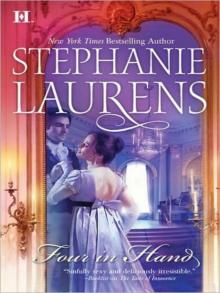 Four In Hand
Four In Hand The Reckless Bride
The Reckless Bride Stephanie Laurens Rogues' Reform Bundle
Stephanie Laurens Rogues' Reform Bundle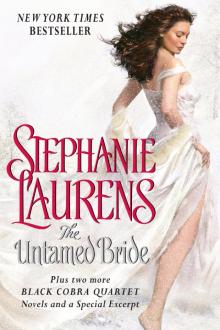 The Untamed Bride Plus Black Cobra 02-03 and Special Excerpt
The Untamed Bride Plus Black Cobra 02-03 and Special Excerpt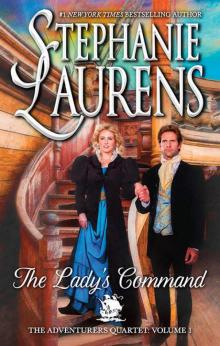 The Lady's Command (Adventurers Quartet #1)
The Lady's Command (Adventurers Quartet #1) The Seduction of Sebastian Trantor
The Seduction of Sebastian Trantor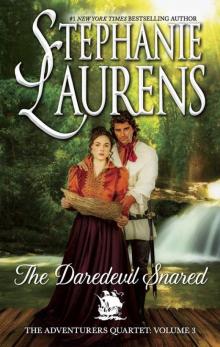 The Daredevil Snared (The Adventurers Quartet Book 3)
The Daredevil Snared (The Adventurers Quartet Book 3)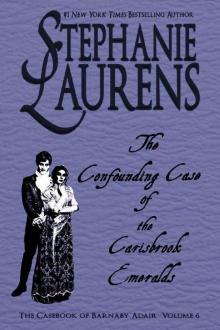 The Confounding Case Of The Carisbrook Emeralds (The Casebook of Barnaby Adair 6)
The Confounding Case Of The Carisbrook Emeralds (The Casebook of Barnaby Adair 6) Lord of the Privateers (The Adventurers Quartet)
Lord of the Privateers (The Adventurers Quartet)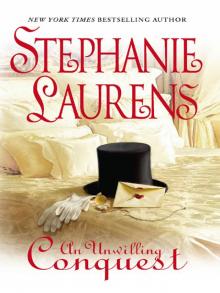 An Unwilling Conquest
An Unwilling Conquest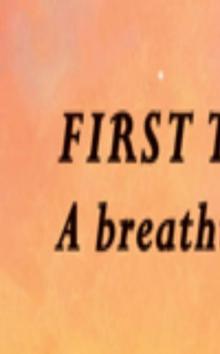 Brazen Bride
Brazen Bride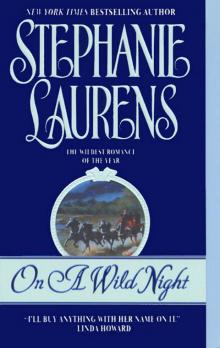 On a Wild Night
On a Wild Night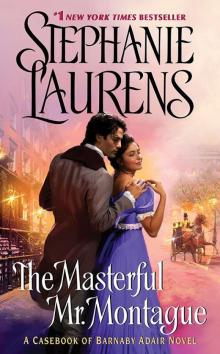 The Masterful Mr. Montague: A Casebook of Barnaby Adair Novel
The Masterful Mr. Montague: A Casebook of Barnaby Adair Novel Lord of the Privateers
Lord of the Privateers Royal Bridesmaids
Royal Bridesmaids Beyond Seduction
Beyond Seduction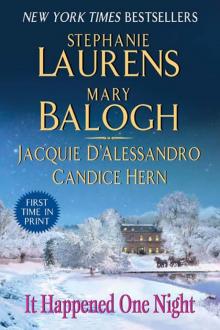 It Happened One Night
It Happened One Night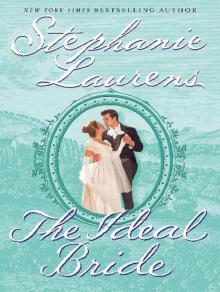 The Ideal Bride
The Ideal Bride The Promise in a Kiss
The Promise in a Kiss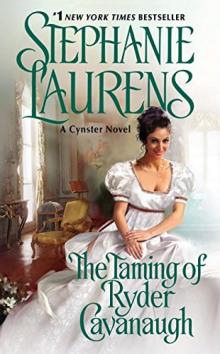 The Taming of Ryder Cavanaugh
The Taming of Ryder Cavanaugh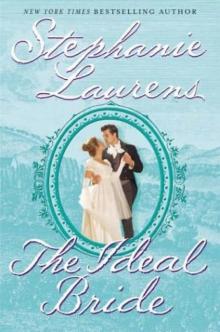 The Ideal Bride c-12
The Ideal Bride c-12 All About Love
All About Love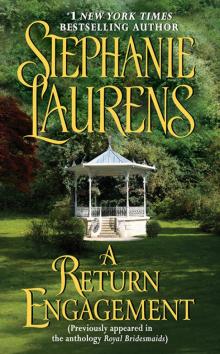 A Return Engagement
A Return Engagement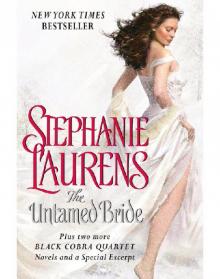 The Untamed Bride Plus Two Full Novels and Bonus Material
The Untamed Bride Plus Two Full Novels and Bonus Material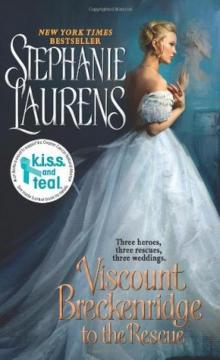 Viscount Breckenridge to the Rescue
Viscount Breckenridge to the Rescue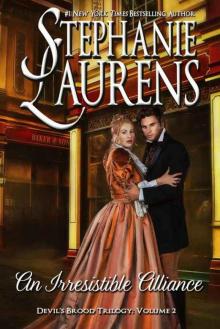 An Irresistible Alliance (Cynsters Next Generation Novels Book 5)
An Irresistible Alliance (Cynsters Next Generation Novels Book 5)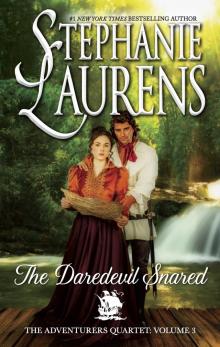 The Daredevil Snared
The Daredevil Snared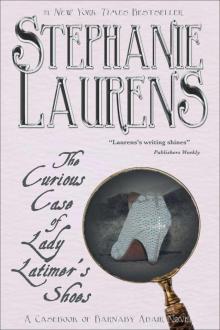 The Curious Case of Lady Latimer's Shoes: A Casebook of Barnaby Adair Novel
The Curious Case of Lady Latimer's Shoes: A Casebook of Barnaby Adair Novel A Lady of Expectations and Other Stories: A Lady of ExpectationsThe Secrets of a CourtesanHow to Woo a Spinster
A Lady of Expectations and Other Stories: A Lady of ExpectationsThe Secrets of a CourtesanHow to Woo a Spinster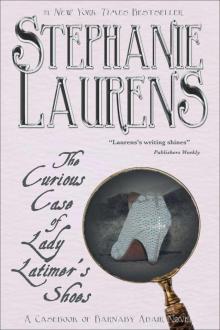 The Curious Case of Lady Latimer's Shoes: A Casebook of Barnaby Adair Novel (The Casebook of Barnaby Adair)
The Curious Case of Lady Latimer's Shoes: A Casebook of Barnaby Adair Novel (The Casebook of Barnaby Adair)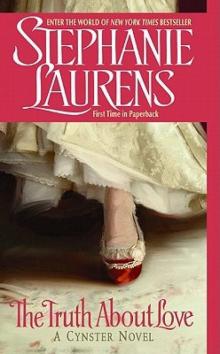 The Truth About Love
The Truth About Love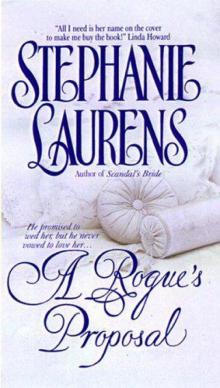 A Rogue's Proposal
A Rogue's Proposal The Elusive Bride
The Elusive Bride The Perfect Lover
The Perfect Lover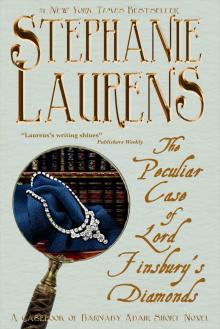 The Peculiar Case of Lord Finsbury's Diamonds: A Casebook of Barnaby Adair Short Novel
The Peculiar Case of Lord Finsbury's Diamonds: A Casebook of Barnaby Adair Short Novel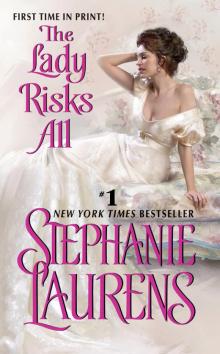 The Lady Risks All
The Lady Risks All The Murder at Mandeville Hall: The Casebook of Barnaby Adair: Volume 7
The Murder at Mandeville Hall: The Casebook of Barnaby Adair: Volume 7 All About Passion
All About Passion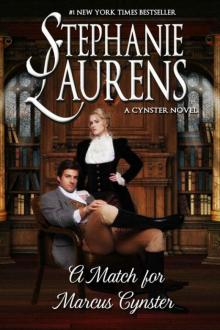 A Match for Marcus Cynster
A Match for Marcus Cynster By Winter's Light: A Cynster Novel (Cynster Special Book 2)
By Winter's Light: A Cynster Novel (Cynster Special Book 2)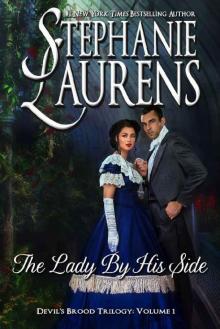 The Lady By His Side
The Lady By His Side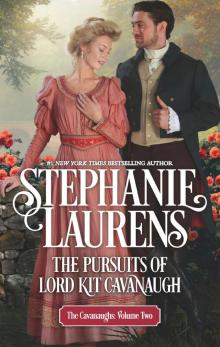 The Pursuits of Lord Kit Cavanaugh
The Pursuits of Lord Kit Cavanaugh Tangled Reins
Tangled Reins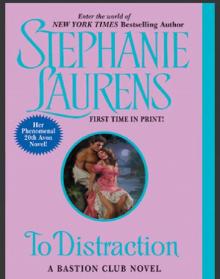 To Distraction
To Distraction A Rake's Vow
A Rake's Vow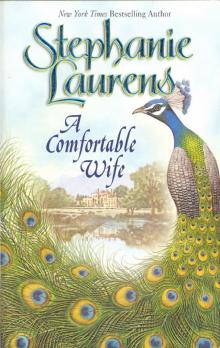 A Comfortable Wife
A Comfortable Wife A Lady of His Own bc-3
A Lady of His Own bc-3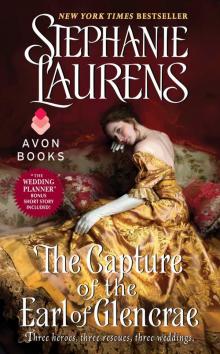 The Capture of the Earl of Glencrae
The Capture of the Earl of Glencrae Scandals Bride c-3
Scandals Bride c-3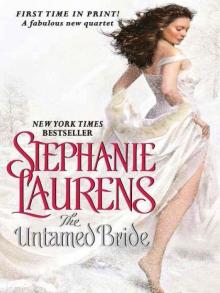 Untamed Bride
Untamed Bride The Brazen Bride
The Brazen Bride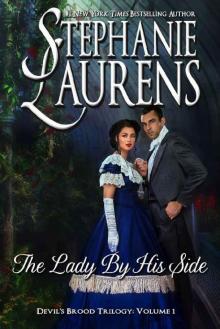 The Lady By His Side (Cynsters Next Generation Novels Book 4)
The Lady By His Side (Cynsters Next Generation Novels Book 4)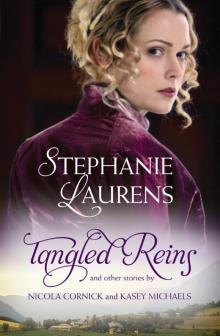 Tangled Reins and Other Stories
Tangled Reins and Other Stories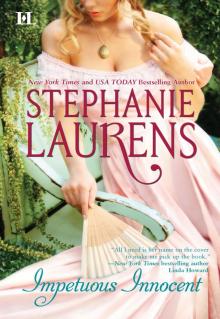 Impetuous Innocent
Impetuous Innocent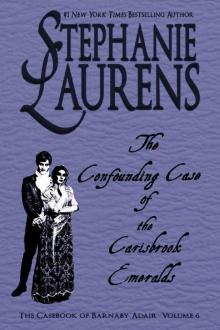 The Confounding Case Of The Carisbrook Emeralds
The Confounding Case Of The Carisbrook Emeralds Stephanie Laurens - B 6 Beyond Seduction
Stephanie Laurens - B 6 Beyond Seduction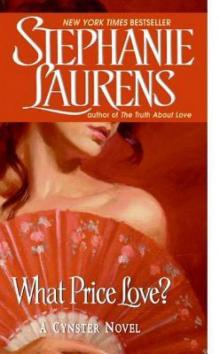 What Price Love?
What Price Love? A Fine Passion
A Fine Passion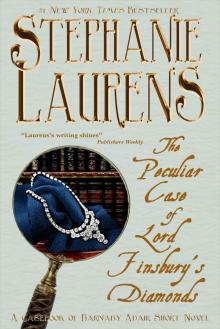 The Peculiar Case of Lord Finsbury's Diamonds: A Casebook of Barnaby Adair Short Novel (The Casebook of Barnaby Adair)
The Peculiar Case of Lord Finsbury's Diamonds: A Casebook of Barnaby Adair Short Novel (The Casebook of Barnaby Adair) Where the Heart Leads
Where the Heart Leads The Designs of Lord Randolph Cavanaugh
The Designs of Lord Randolph Cavanaugh A Secret Love c-5
A Secret Love c-5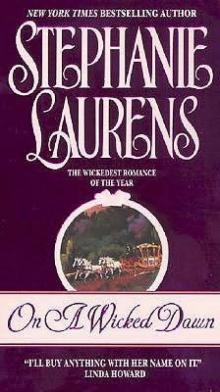 On a Wicked Dawn c-10
On a Wicked Dawn c-10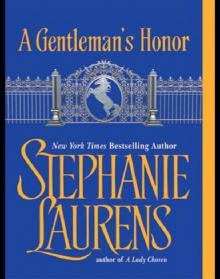 A Gentleman's Honor
A Gentleman's Honor THE LEGEND OF NIMWAY HALL_1750_JACQUELINE
THE LEGEND OF NIMWAY HALL_1750_JACQUELINE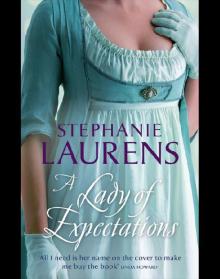 A Lady of Expectations
A Lady of Expectations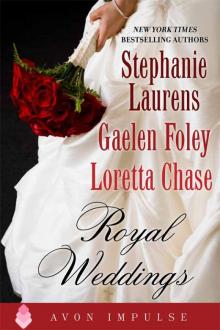 Royal Weddings: An Original Anthology
Royal Weddings: An Original Anthology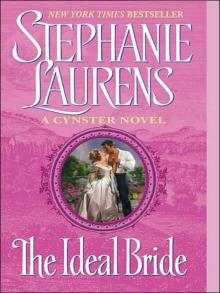 The Ideal Bride (Cynster Novels)
The Ideal Bride (Cynster Novels) Mastered by Love
Mastered by Love A Buccaneer at Heart
A Buccaneer at Heart Captain Jack’s Woman / A Gentleman's Honor
Captain Jack’s Woman / A Gentleman's Honor Devil's Bride with Bonus Material
Devil's Bride with Bonus Material A Lady of His Own
A Lady of His Own A Secret Love
A Secret Love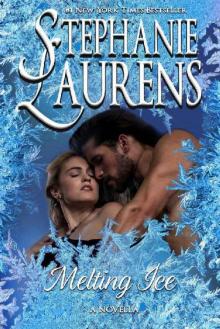 Melting Ice
Melting Ice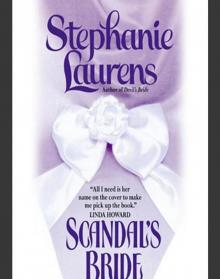 Scandal's Bride
Scandal's Bride Lady Osbaldestone’s Christmas Goose
Lady Osbaldestone’s Christmas Goose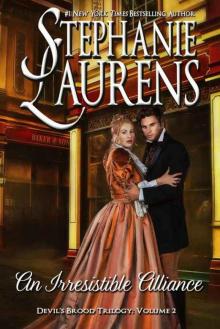 An Irresistible Alliance
An Irresistible Alliance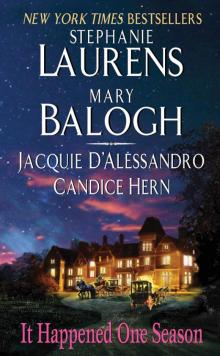 It Happened One Season
It Happened One Season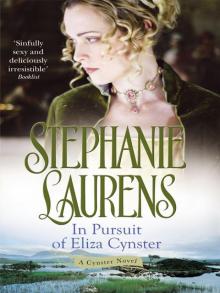 In Pursuit Of Eliza Cynster
In Pursuit Of Eliza Cynster Captain Jack's Woman
Captain Jack's Woman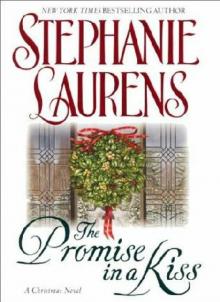 The promise in a kiss c-8
The promise in a kiss c-8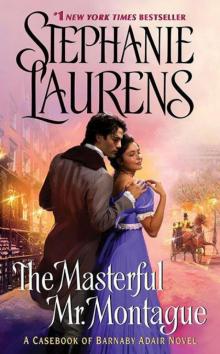 The Masterful Mr. Montague
The Masterful Mr. Montague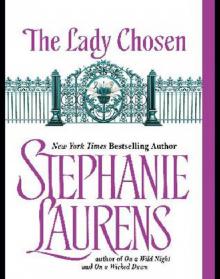 The Lady Chosen
The Lady Chosen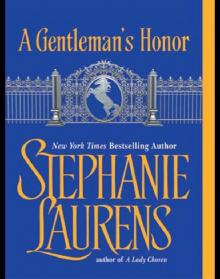 A Gentleman's Honor bc-2
A Gentleman's Honor bc-2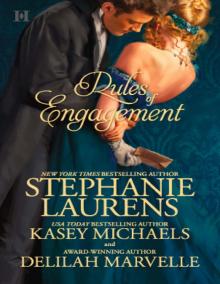 Rules of Engagement: The Reasons for MarriageThe Wedding PartyUnlaced (Lester Family)
Rules of Engagement: The Reasons for MarriageThe Wedding PartyUnlaced (Lester Family) Secrets of a Perfect Night
Secrets of a Perfect Night The Taste of Innocence
The Taste of Innocence On A Wicked Dawn
On A Wicked Dawn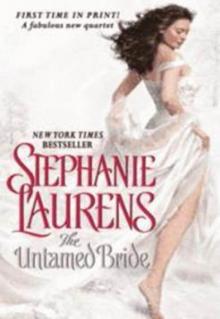 The Untamed Bride
The Untamed Bride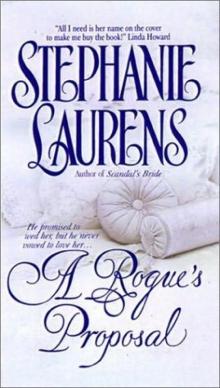 A Rogues Proposal c-4
A Rogues Proposal c-4 Rakes Vow c-2
Rakes Vow c-2 Devils Bride c-1
Devils Bride c-1 Hero, Come Back
Hero, Come Back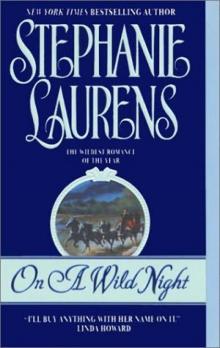 On a Wild Night c-8
On a Wild Night c-8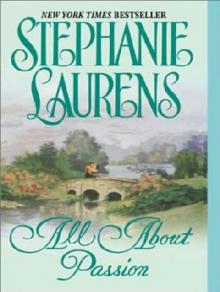 All About Passion c-7
All About Passion c-7